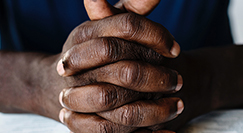About
Polis (pōləs): city (Greek); a community characterized by a sense of making a difference for the greater good
The Polis Center–a unit in the IU Luddy School of Informatics, Computing and Engineering at Indianapolis—works with community partners in Indiana and beyond to develop innovative place-based policies and practices for healthier and more resilient communities. It supports community development and quality-of-life efforts, natural disaster resiliency, and population health management using geospatial technologies to integrate, manage, and visualize the rapidly growing information on the places where we live and work. We do this through place-based research, analysis, collaborations, and advanced information technologies. We help communities and organizations build capacity, provide actionable information, and develop knowledge platforms.
Our Geoinformatics work plays a critical role in supporting natural disaster mitigation for greater resiliency and responsiveness to climate change and its social, health, and economic repercussions. Polis Center crisis informatics initiatives support disaster preparedness, mitigation, response, and recovery activities. The center designs and implements research to evaluate the physical, social, and economic impacts of hazards.
The Community Informatics area builds solutions grounded in data, research, and community process. Our work includes building community information systems and decision-support tools; transforming data to extend its utility; developing and analyzing community data to understand social issues and how they affect communities; bringing academic research to practical applications; fostering data literacy; and building capacity in others to use information for decision-making.
The Community Health Informatics team collaborates with the public health, healthcare, social service, government, and academic sectors to enhance local capacity to understand and address population health and its social and environmental determinants through community research and analysis, collaboration, and application of advanced information technologies.
The Polis Center is nationally recognized as a dynamic urban-centered, learning environment with highly professional staff who excel in partnerships, real-world application, and winning solutions for the communities. From inception, The Polis Center has been guided by core values that include: making a difference, collaboration, developing creative solutions to real-world problems, accountability, integrity, respect, and stewardship.
For more information, download our Polis Center general information brochure and Polis Center expertise flyer. Visit SAVI.org to learn more about the SAVI Community Information System, our project that is the nation’s earliest, largest, and most comprehensive system. It integrates data from more than 45 providers to provide an interactive, in-depth look at the Indianapolis MSA at scales from census tracts and neighborhoods to the region at large.
Healthy Communities
Knowledgeable Communities
Resilient Communities
Spatial Humanities
Other Signature Projects of Note
Encyclopedia of Indianapolis
In 1994, we published a 1,600-page encyclopedia that provides a comprehensive social, cultural, economic, historical, political, and physical description of Indianapolis. It was hailed as a national model for urban encyclopedias. We developed an updated, digital Encyclopedia of Indianapolis, which launched November 2021. The web-based, free-access Encyclopedia of Indianapolis aims to be the major source of information on the city and region. Designated a legacy project of the Indianapolis Bicentennial Commission, the digital Encyclopedia of Indianapolis is the hub of an innovative knowledge environment, linking resources from multiple organizations across desktop and mobile devices. It is highly visual, interactive, and dynamic.
Project on Religion and Urban Culture
We seek to understand the ways in which religion and community have shaped each other in greater Indianapolis. Using community-academic collaborations, our studies took place between 1996 – 2002 (RUC 1.0) and 2020 – 2022 (RUC 2.0). In so doing, we have compiled the largest collection of meaningful religious data ever gathered on one American city.



